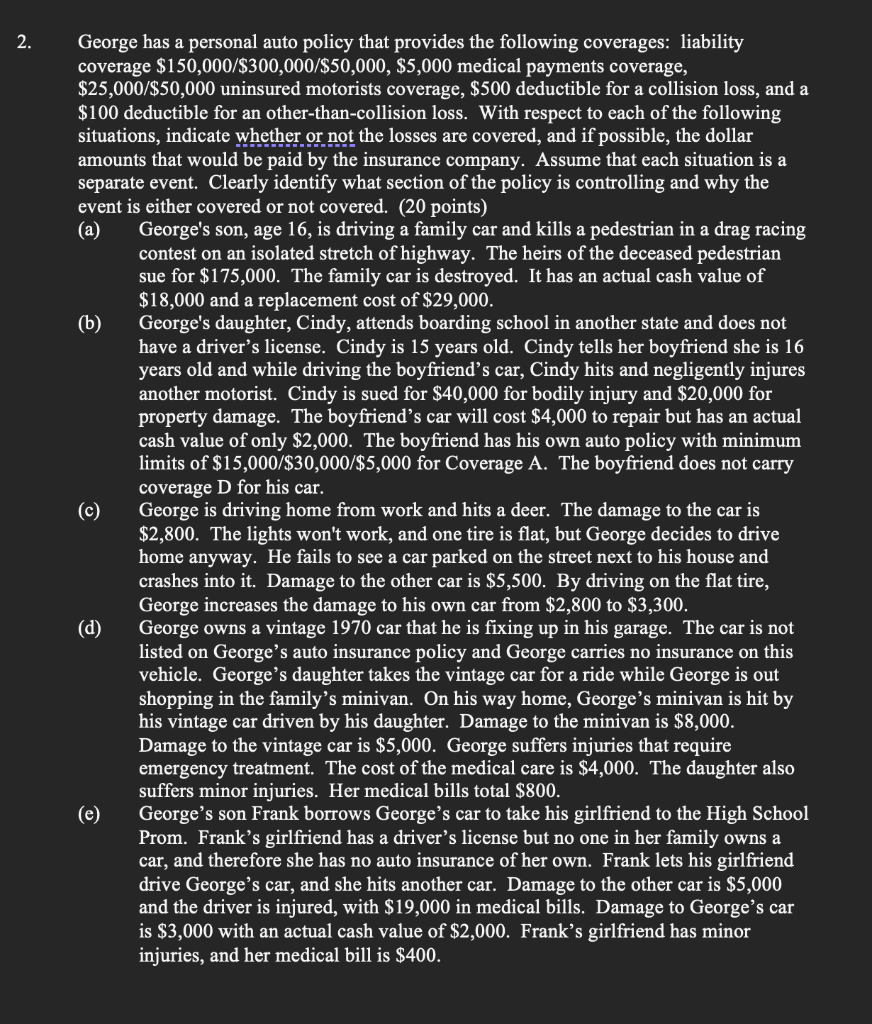
eorge has a personal auto policy that provides the following coverages: liability verage $150,000/$300,000/$50,000,$5,000 medical payments coverage, 25,000/$50,000 uninsured motorists coverage, $500 deductible for a collision loss, and a 100 deductible for an other-than-collision loss. With respect to each of the following tuations, indicate whether or not the losses are covered, and if possible, the dollar nounts that would be paid by the insurance company. Assume that each situation is a parate event. Clearly identify what section of the policy is controlling and why the rent is either covered or not covered. (20 points) George's son, age 16, is driving a family car and kills a pedestrian in a drag racing contest on an isolated stretch of highway. The heirs of the deceased pedestrian sue for $175,000. The family car is destroyed. It has an actual cash value of $18,000 and a replacement cost of $29,000. George's daughter, Cindy, attends boarding school in another state and does not have a driver's license. Cindy is 15 years old. Cindy tells her boyfriend she is 16 years old and while driving the boyfriend's car, Cindy hits and negligently injures another motorist. Cindy is sued for $40,000 for bodily injury and $20,000 for property damage. The boyfriend's car will cost $4,000 to repair but has an actual cash value of only $2,000. The boyfriend has his own auto policy with minimum limits of $15,000/$30,000/$5,000 for Coverage A. The boyfriend does not carry coverage D for his car. George is driving home from work and hits a deer. The damage to the car is $2,800. The lights won't work, and one tire is flat, but George decides to drive home anyway. He fails to see a car parked on the street next to his house and crashes into it. Damage to the other car is $5,500. By driving on the flat tire, George increases the damage to his own car from $2,800 to $3,300. George owns a vintage 1970 car that he is fixing up in his garage. The car is not listed on George's auto insurance policy and George carries no insurance on this vehicle. George's daughter takes the vintage car for a ride while George is out shopping in the family's minivan. On his way home, George's minivan is hit by his vintage car driven by his daughter. Damage to the minivan is $8,000. Damage to the vintage car is $5,000. George suffers injuries that require emergency treatment. The cost of the medical care is $4,000. The daughter also suffers minor injuries. Her medical bills total $800. George's son Frank borrows George's car to take his girlfriend to the High School Prom. Frank's girlfriend has a driver's license but no one in her family owns a car, and therefore she has no auto insurance of her own. Frank lets his girlfriend drive George's car, and she hits another car. Damage to the other car is $5,000 and the driver is injured, with $19,000 in medical bills. Damage to George's car is $3,000 with an actual cash value of $2,000. Frank's girlfriend has minor injuries, and her medical bill is $400. eorge has a personal auto policy that provides the following coverages: liability verage $150,000/$300,000/$50,000,$5,000 medical payments coverage, 25,000/$50,000 uninsured motorists coverage, $500 deductible for a collision loss, and a 100 deductible for an other-than-collision loss. With respect to each of the following tuations, indicate whether or not the losses are covered, and if possible, the dollar nounts that would be paid by the insurance company. Assume that each situation is a parate event. Clearly identify what section of the policy is controlling and why the rent is either covered or not covered. (20 points) George's son, age 16, is driving a family car and kills a pedestrian in a drag racing contest on an isolated stretch of highway. The heirs of the deceased pedestrian sue for $175,000. The family car is destroyed. It has an actual cash value of $18,000 and a replacement cost of $29,000. George's daughter, Cindy, attends boarding school in another state and does not have a driver's license. Cindy is 15 years old. Cindy tells her boyfriend she is 16 years old and while driving the boyfriend's car, Cindy hits and negligently injures another motorist. Cindy is sued for $40,000 for bodily injury and $20,000 for property damage. The boyfriend's car will cost $4,000 to repair but has an actual cash value of only $2,000. The boyfriend has his own auto policy with minimum limits of $15,000/$30,000/$5,000 for Coverage A. The boyfriend does not carry coverage D for his car. George is driving home from work and hits a deer. The damage to the car is $2,800. The lights won't work, and one tire is flat, but George decides to drive home anyway. He fails to see a car parked on the street next to his house and crashes into it. Damage to the other car is $5,500. By driving on the flat tire, George increases the damage to his own car from $2,800 to $3,300. George owns a vintage 1970 car that he is fixing up in his garage. The car is not listed on George's auto insurance policy and George carries no insurance on this vehicle. George's daughter takes the vintage car for a ride while George is out shopping in the family's minivan. On his way home, George's minivan is hit by his vintage car driven by his daughter. Damage to the minivan is $8,000. Damage to the vintage car is $5,000. George suffers injuries that require emergency treatment. The cost of the medical care is $4,000. The daughter also suffers minor injuries. Her medical bills total $800. George's son Frank borrows George's car to take his girlfriend to the High School Prom. Frank's girlfriend has a driver's license but no one in her family owns a car, and therefore she has no auto insurance of her own. Frank lets his girlfriend drive George's car, and she hits another car. Damage to the other car is $5,000 and the driver is injured, with $19,000 in medical bills. Damage to George's car is $3,000 with an actual cash value of $2,000. Frank's girlfriend has minor injuries, and her medical bill is $400







